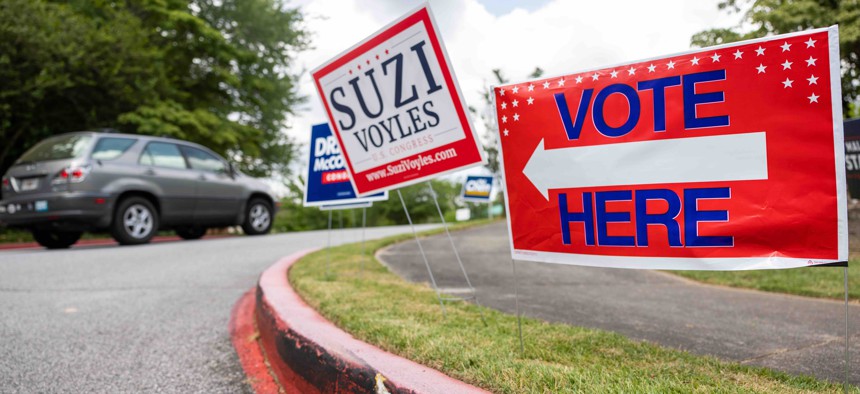Election Laws in Red and Blue States are Changing. Here's How

Election signs are seen on election day for the Georgia primary election on May 24th, 2022 at Spalding Drive Elementary School in Atlanta, Georgia. Nathan Posner/Anadolu Agency via Getty Images
With primaries underway and this year's November elections approaching, lawmakers in Republican and Democratic states have overhauled laws to both increase and tighten ballot access.
For the past few years, Republican-led states have been ramping up their efforts to make it harder to vote and make it easier for political partisans to interfere with election results.
The movement has been fueled by false claims about voter fraud that have been stoked by former President Donald Trump and his supporters.
But a handful of other states, most of them led by Democrats, have approved measures to increase ballot access.
Last month, the Delaware legislature passed a bill that enshrines into law the right of voters to cast a ballot by mail. The measure, which passed with bipartisan support, awaits Democratic Gov. John Carney Jr.’s signature.
In her testimony prior to the legislature’s vote, Claire Snyder-Hall, executive director of Common Cause Delaware, said universal mail-in voting will lead to more ballots being cast. She cited the upswing in participation in 2020, when the state, like many others, loosened restrictions on absentee voting as a way to minimize the spread of the coronavirus.
“Vote-by-mail programs have been under attack in the past year—by anti-voter zealots who want to make voting harder in order to advance their extremist agenda,’’ Snyder-Hall said. “But for a strong, healthy democracy, we need to remove unnecessary barriers to participation, and make sure every voter has the option to vote safely and securely by mail.”
In another move to ease access to the ballot, Delaware lawmakers this year also approved same day voter registration.
A survey of state election legislation released by the Brennan Center for Justice in May found a spike in bills designed to undermine confidence in voting and allow partisan politicians to meddle with election outcomes.
At least seven states have enacted these sorts of "election interference" laws, according to the center. They include Alabama, Kentucky, and Oklahoma, which passed measures criminalizing the use of private funding for election-related expenses; Florida, which created a new election crimes office within the Florida Department of State, to investigate and prosecute election crimes, and Arizona, which charges election officials with a felony if they accept a non-citizen’s voter registration, even if the paperwork was accepted by mistake.
Civil liberties groups say such bills dampen democracy and disenfranchise voters of color, the elderly, rural residents and the poor. And elections experts emphasize that voter fraud is extremely rare in the U.S.
In several other states, restrictive bills did not win final legislative approval or were vetoed by the governor.
The bills follow an earlier round of restrictive voting laws passed by Republican-led states in 2021. Among those was Georgia’s sweeping S.B. 202, which makes changes to when a voter can request an absentee ballot and moves up the deadline for that ballot to be returned, among a host of other provisions.
The bill, which was signed into law by Republican Gov. Brian Kemp, also caps the number of ballot drop boxes and sets out new rules for voter identification. Those seeking a mail-in ballot would have to provide a driver’s license number, a state identification number or a copy of an acceptable voter ID.
Trey Hood, a professor of political science at the University of Georgia, said the 98-page bill is complicated and “the devil is in the details.” He noted that elements of the legislation, such as the provisions for ballot drop boxes, actually expand access; prior to the pandemic, such boxes did not exist.
“The law in Georgia was clearly passed by Republicans in the legislature…in response to allegations made during the outcome of the election that there was fraud,” Hood said. “There’s no evidence of that and this law doesn’t necessarily say there's evidence of that but it was really passed to shore up confidence with the [Republican] base.”
The Brennan Center report also cited states expanding voter access. In some of those cases, the states simply made permanent the temporary rules adopted during the first year of the pandemic.
Connecticut expanded its fairly restrictive absentee voting rules to cover people who will be unable to appear in person during some—rather than all—of the hours their polling place is open. The legislature also permits caretakers of sick or disabled people to vote by mail.
A measure approved in Arizona now requires communities with more than 20,000 people to provide a mail-in voting option to individuals with impaired vision.
And New York expanded the definition of an illness that qualifies people to cast absentee ballots to include the risk of contracting or spreading a disease through the 2022 election cycle.
“The pandemic caused a reassessment across a lot of different states, blue and red,’’ Hood observed.





